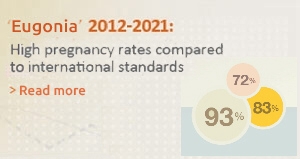Hyperprolactinaemia is diagnosed when prolactin blood levels are higher than 20 ng/ml. These high levels inhibit the production on GnRH which results in the lowering of FSH and LH. The most common causes of hyperprolactinaemia are: stress , PCOS, hyperthyroidism, some types of medication (such as antihistamines, a few contraceptive pills, oestrogen, dopamine antagonists and amphetamines), breast operations and herpes infections.
The main symptoms are ovulation disorders leading to infertility and low libido. Hyperprolactinaemia can be accompanied by prolactinomata (tumors in or near the pituitary) and, rarely, Cushing syndrome may also be present. In a small number of women, hyperprolactinaemia has been associated with hypothyroidism due to low levels of thyroxin causing high levels of TSH and prolactin. The most effective treatments are dopamine agonists and hypothyroidism medication.






























